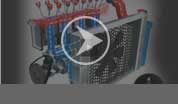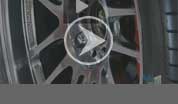VIDEO BLOG
Fuel System Cleaning at Des Moine BDG for Better Performance
August 13, 2015Hi Des Moines car owners. Let’s talk fuel injectors. A fuel injector is a valve that delivers fuel to a vehicle’s engine. It has to deliver the precise amount of fuel, to precisely the right place, precisely when the engine needs it. The fuel also has to be mixed with air before it can burn in the engine.
Fuel injectors are engineered to spray fuel in a specific pattern into the engine. (The pattern varies by engine type and design.) In order to achieve these spray patterns, the fuel must be pressurized.
The pressure in a fuel injection system varies depending on its type. Many gasoline minivan engines use port injection systems, which operate with a pressure of 60 pounds per square inch. Newer direct injection systems operate at 10 to 30 times that pressure. Some diesel passenger vehicles have fuel injectors that operate at 30,000 pounds or more per square inch.
 Vehicles have one fuel injector for each cylinder in the engine. Your vehicle’s control computer constantly monitors the engine and various sensors in the vehicle and adjusts the fuel injectors accordingly so that they can deliver the proper amount of fuel to the engine. As you can see, fuel injectors are a sophisticated and vital part of your vehicle’s engine. Because fuel injectors are such precision instruments, dirt and contaminants are a serious detriment to their performance. When an injector gets gummed up, it affects the pressure, pattern and timing of the fuel delivery. The result is a decrease in fuel efficiency and loss of engine performance for Des Moines drivers.
Vehicles have one fuel injector for each cylinder in the engine. Your vehicle’s control computer constantly monitors the engine and various sensors in the vehicle and adjusts the fuel injectors accordingly so that they can deliver the proper amount of fuel to the engine. As you can see, fuel injectors are a sophisticated and vital part of your vehicle’s engine. Because fuel injectors are such precision instruments, dirt and contaminants are a serious detriment to their performance. When an injector gets gummed up, it affects the pressure, pattern and timing of the fuel delivery. The result is a decrease in fuel efficiency and loss of engine performance for Des Moines drivers.
So it’s to Des Moines auto owners’ advantage to keep their fuel injectors clean. That starts with keeping the fuel in your tank clean. High-quality fuel contains detergents and additives that help clean your engine. Brand-name fuel companies also deliver a more consistent quality of fuel to Des Moines car owners than do bargain Altoona area service stations.
The second way to keep your injectors clean is to keep your fuel filter clean. This filter screens dirt and rust out of the fuel as it travels from the tank to the engine. If the filter clogs up, fuel will bypass it and carry its load of dirt into the engine.
Des Moines motorists should check their owner’s manual to find out how often they should change their fuel filter. This should be part of your regular preventive maintenance. Also, remember that if you use bargain-brand or low-grade fuels, or if you drive an older vehicle between Des Moines, Ankeny and Berwick , your filter will need to be changed more often.
You can also purchase cleaners at Des Moine BDG that will protect your fuel injectors. These cleaners are added to the fuel tank. They work best at preventing build-up in your fuel injectors and can clean up small amounts of carbon, gum and varnish. But they won’t be able to clean a fully gummed-up injector. Read the labels before using any of these products for full directions on their use. If your fuel injectors are gummed up, you can get a professional deep cleaning service at Des Moine BDG in Des Moines that will result in better fuel efficiency and improved vehicle performance.
Good car care will prevent serious damage to your fuel injector system. And this is one system that you want to keep in perfect condition.
This entry was posted in Fuel System. Bookmark the permalink.
Gear Up: Transmission Service at Des Moine BDG in Des Moines
August 12, 2015The transmission system in your vehicle allows you to change gears. Lower gears are power gears. They get your vehicle moving and get it up hills. Higher gears get the vehicle up to speed and get it rolling faster. If you have a standard transmission, then you have to do the work of shifting gears yourself. But with an automatic transmission, the vehicle shifts gears on its own. It automatically starts out in low gear and automatically shifts to high gears as it gets rolling. Again, it will automatically shift to a lower gear to climb hills or when you need a burst of speed.
How does it know when to change gears? Today’s automatic transmissions are computer-controlled. The computer gathers information about what the vehicle is doing, and changes the gears as needed.
Automatic transmissions are becoming more sophisticated all the time. More gears, or “speeds” are being added. Almost all vehicles have four at least speeds. Five or six is common. Some auto manufacturers are even increasing to seven or eight – up to ten. Adding gears has a lot of advantages for Des Moines auto owners: it improves fuel efficiency and increases performance.
But there is a drawback for Des Moines motorists: more gears equals more parts and a more complex transmission system. Plus, all those parts need to fit into the same space as older, less complex transmissions. This means that today’s transmissions are engineered to much tighter tolerances. In other words, they demand meticulous care from Des Moines car owners. Transmissions are designed for durability. But that durability can be compromised if they aren’t given proper care.
That’s why changing transmission fluid is such a critical part of preventive maintenance for Des Moines auto owners. Transmission fluid lubricates the transmission and keeps it in good working order. But if the fluid runs low, transmission parts will wear out quickly or suffer pricey damage due to increased friction. The transmission can even fail.
Dirty transmission fluid can clog the small passageways in the transmission, blocking lubricant from reaching all of its parts. Again, this can lead to increased wear, damage or failure.
New transmissions aren’t cheap. Repairing them isn’t cheap either. But changing transmission fluid is fairly inexpensive for Des Moines car owners at Des Moine BDG. That’s why responsible car care includes maintenance on the transmission system at Des Moine BDG. It doesn’t take a genius to figure out that periodic fluid changes aren’t just good auto advice, they actually pay for themselves by preventing costly transmission repairs.
This entry was posted in Transmission. Bookmark the permalink.
Keep Your Tires Well Rounded in Des Moines: Tire Rotation and Wheel Balancing at Des Moine BDG
August 4, 2015
Taking care of our tires is a critical part of car care for Des Moines drivers. We know they have to be replaced when they wear out, but tires also require some critical preventive maintenance. This maintenance will improve MPG and extend the life of the tires, so it’s well worth the effort and expense for Des Moines auto owners to get it done. Tire maintenance includes keeping tires properly inflated, rotating tires and balancing wheels.
The recommended tire pressure for a vehicle’s tires is printed on a sticker on the inside of the driver’s side doorjamb. A lot of engineering goes into calculating the correct pressure, so it’s a key number for Des Moines motorists to know. Not following this recommendation can throw off the suspension system and can lead to expensive tire damage. Underinflated tires wear out more quickly than properly inflated tires. Vehicles also get better traction, handling and gas mileage on properly inflated tires. Check your tire pressure at least once a week and add air if necessary.
Don’t be tempted to add a bit of extra air to your tires when you fill them. Overinflated tires will cause the center tread to wear unevenly because of improper contact with the road. It will also reduce the handling performance of your vehicle.
Rotating tires allows all four tires on a vehicle to wear evenly. Front tires get more wear than rear tires because they do most of the work on turns. Tire rotation allows all of the tires to spend time on the front of the car so they all experience the extra wear.
For most vehicles, tire rotation is simply a matter of moving the front tires to the rear and vice versa. Some vehicles, however, recommend a cross-rotational pattern. Other vehicles use asymmetrical tires, which means the right tires have to stay on the right side of the car and the left tires on the left. Some vehicles use differently sized wheels on the front and back of the car and should not have their tires rotated.
What kind of rotation do you need? Check your owner’s manual or talk to your helpful Des Moine BDG tech. Your owner’s manual will have information about how to rotate your vehicle’s tires as well as letting you know how often you should get it done. For most vehicles, that’s usually every 5,000 miles. Your helpful Des Moine BDG service professional can also offer auto advice about tire rotation. A quick tire inspection can also indicate whether or not your tires are due to be rotated.
When it comes to tire maintenance for Des Moines motorists, wheel balancing is usually what we know least about. Balancing a wheel is necessary to keep it in constant contact with the road. If a tire is not balanced properly, it actually hops along the roadway. You can feel this hopping as a vibration in your steering wheel if the unbalanced tire is a front tire. You’ll feel the vibration through your seat if a rear tire is unbalance. Properly balancing your tires is important and will extend their life span, improve handling and improve the safety of your vehicle. When you replace your tires, the new tires need to be balanced.
Never use different sized tires on the same axle of a vehicle. In other words, your front tires need to be the same size and your rear tires need to be the same size. Mixing sizes can lead to some serious handling problems for Des Moines auto owners.
If you have an all-wheel drive or four-wheel drive vehicle all four tires need to be the same size. If your tires are wearing out, you can sometimes make a new tire purchase fit within your budget by only buying two tires at a time. When you do this, the new tires should be installed on the rear of the vehicle. Rear tires are more in need of the traction than your front tires to avoid spinning out on slippery surfaces. If you drive a vehicle around Altoona, you need tires, so Des Moines drivers need to know how to care for them. The safety of your minivan can depend on the condition of your tires.
This entry was posted in Tires and Wheels. Bookmark the permalink.
Check Engine Light Diagnosis At Des Moine BDG
July 28, 2015Hello Des Moines motorists. Have you ever had your check engine light come on? Did you panic? Or just scowl and ignore it? What should you do? Pull to the side of the road and call a tow truck? Or just keep driving? What does that little light really mean for Des Moines auto owners?
First of all, the Check Engine or Service Engine light does indicate that something is wrong. That’s why it is called a warning light. But the something that is wrong might be a loose gas cap, or it might be serious minivan engine trouble. That’s why Altoona car owners often don’t know how to respond to it.
The check engine light has two modes: it flashes or it stays on. A flashing light is serious. You need to get your vehicle to Des Moine BDG in Des Moines ASAP. No, you don’t need to call a tow truck, but, yes, you can’t wait to get your car serviced. If your check engine light is on and flashing, you should not tow trailers, haul heavy loads or drive at IA interstate speeds. Any of these could lead to serious damage that could result costly repair bills for Des Moines auto owners who ignore it.
A steady check engine light is less serious, but that doesn’t mean it can be ignored by Grimes drivers. You should plan to get your vehicle inspected at your local Des Moines automotive service center the first realistic opportunity. Not the first convenient opportunity, but the first realistic one.
Before you take your minivan in, however, check the gas cap. A loose gas cap can trigger the check engine light. If it is loose, twist it until it clicks three times. If that was the problem, your Des Moines engine light will reset after several days. However, if it stays on, then you need to schedule an inspection at your Des Moines auto repair center center or Des Moine BDG.
Modern automobiles have a computer in the engine that monitors and controls many of the engine functions. When the computer senses something wrong, it first tries to fix the problem itself by adjusting the minivan engine. If the problem persists, the computer signals the check engine light to come on.
This process stores a trouble code inside the minivan engine’s computer. Your service specialist scans the computer and reads the code. This does not tell the tech exactly what is wrong with the car, but it gives him a good idea as to where to start looking.
It is NOT good auto advice to deal with a check engine light by disconnecting the battery. Yes, this makes the light go off, but it doesn’t solve the problem. It’s rather like trying to put out a fire by disconnecting the smoke detector. Also, disconnecting the battery will erase your minivan’s computer memory. An engine’s computer, over time, learns to adjust for peculiarities of the specific minivan engine, for driving conditions in your Berwick area, and for your driving habits. Losing its memory means it has to learn and adjust for these things all over again.
Also, don’t buy a cheap consumer scanner or get a trouble code read at your nearest Des Moines auto parts store, then try to fix a problem yourself — unless, of course, you are a trained Altoona mechanic. Today’s auto repair equipment is fairly high-tech and knowing a code is only an indication of where a problem might be, not the answer to what is wrong. Trying to save a little money by doing it yourself may end up costing you big in the long run.
Of course, the best thing to do is to keep that pesky check engine light from coming on in the first place. Good car care and routine preventive maintenance go a long way to keeping your minivan out of your Des Moines auto repair shop. But, if that light does come on, be smart. Take care of the problem early, and take care of it professionally.
This entry was posted in Check Engine Light. Bookmark the permalink.
The Des Moine BDG Guide To Caring For Your Transmission
July 21, 2015
Most cars and trucks have automatic transmissions, yet a lot of Ankeny drivers only have a fuzzy understanding about what a transmission does. Think back to the last time you rode a bike in Ankeny. You started out in a lower gear and shifted to higher gears as you went faster. Down shift for hills, stuff like that. Think of your legs as the engine – there’s an ideal speed you can pedal and you change gears to leverage the work you’re doing.
Lower gears for power on hills or for starting out. Higher gears for more speed. That’s what the automatic transmission does – it automatically starts in lower gears and shifts up to higher gears to go faster on IA freeways. And automatically shifts back down to climb Ankeny hills, pass or start up again.
minivan automatic transmissions have certainly gotten more sophisticated in recent years. They have more speeds than before: the base is four speeds, five is very common.
At Des Moine BDG, we routinely service transmissions with six speeds and several have seven or even eight speeds. As you can imagine, this means more parts. Any they all have to fit into roughly the same space.
Transmissions are computer controlled these days, with some high end transmissions having two or three computers. Transmissions are engineered to last. But they are also engineered to tighter tolerances. If a portion of the transmission is starved for lubrication, it can lead to failure.
Not enough fluid can starve the transmission or dirty transmission fluid can clog small passages in the transmission, then the lubricant is blocked and can’t get to all the parts to protect them, so they wear out prematurely. The technicians at Des Moine BDG see far too many transmissions that needlessly failed due to neglect.
And, as you can imagine, repairing one of these new transmissions at any Des Moines service center can be quite costly. That’s why car makers have a schedule for how often you should change the fluid and what type of fluid to use.
It’s really important for Ankeny drivers to carefully follow the manufacturer’s transmission service schedule.
At Des Moine BDG in Des Moines, we hope you never become shiftless in Ankeny because you didn’t take care of your transmission.
This entry was posted in Transmission. Bookmark the permalink.







